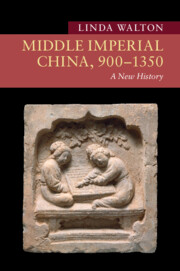Book contents
- Middle Imperial China, 900–1350
- New Approaches to Asian History
- Middle Imperial China, 900–1350
- Copyright page
- Dedication
- Contents
- Figures
- Maps
- Acknowledgments
- Introduction
- 1 The Turbulent Tenth Century
- 2 Song in a Multipolar World
- 3 Schooling, State, and Society in Song and Jin
- 4 An Economic Revolution?
- 5 Cities and Urban Life
- 6 Religious Transformations
- 7 Ways of Knowing
- 8 The Arts of Culture
- 9 Gendered and Generational Lives
- 10 Mapping the Built and Natural Environment
- 11 Sustaining Life and Healing Bodies
- 12 The Mongol Yuan Dynasty in China
- 13 Yuan China in the Mongol Eurasian Empire
- Bibliography
- Index
- New Approaches to Asian History
3 - Schooling, State, and Society in Song and Jin
Published online by Cambridge University Press: 20 July 2023
- Middle Imperial China, 900–1350
- New Approaches to Asian History
- Middle Imperial China, 900–1350
- Copyright page
- Dedication
- Contents
- Figures
- Maps
- Acknowledgments
- Introduction
- 1 The Turbulent Tenth Century
- 2 Song in a Multipolar World
- 3 Schooling, State, and Society in Song and Jin
- 4 An Economic Revolution?
- 5 Cities and Urban Life
- 6 Religious Transformations
- 7 Ways of Knowing
- 8 The Arts of Culture
- 9 Gendered and Generational Lives
- 10 Mapping the Built and Natural Environment
- 11 Sustaining Life and Healing Bodies
- 12 The Mongol Yuan Dynasty in China
- 13 Yuan China in the Mongol Eurasian Empire
- Bibliography
- Index
- New Approaches to Asian History
Summary
Beginning in the late tenth century, a key feature of the new Song government was the use of the examination system to recruit and select officials. Central to this effort was the need for schools to educate men for governance. The content of education was classical, rooted in the texts of Confucian tradition believed to cultivate loyalty to the state and its ruler, and the ability to administer the laws and regulations of the empire. To that end, the Imperial University in the capital served as the primary educational institution, and a hierarchy of official agencies administered the examinations. By the mid-eleventh century, state schools were promoted to support the recruitment and training of government officials. The spread of print technology was both supported by, and contributed to, the expansion of the examinations. Competition among candidates created a commercial market for cheap printed editions and the availability of these increased access. To what degree did the examination system foster social mobility? How crucial was marriage to the right family, and how important was wealth as opposed to pedigree? How did the Jurchen Jin incorporate Han Chinese scholars and officials along with the examination system in their rule of the north?
- Type
- Chapter
- Information
- Middle Imperial China, 900–1350A New History, pp. 69 - 90Publisher: Cambridge University PressPrint publication year: 2023

